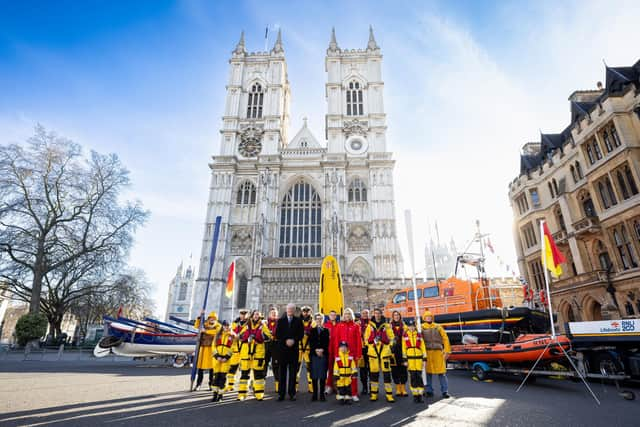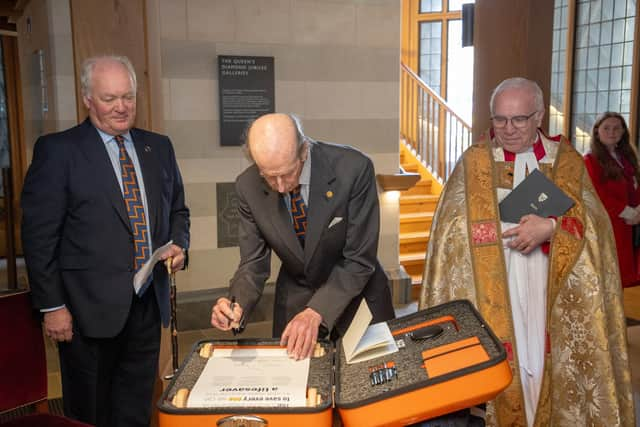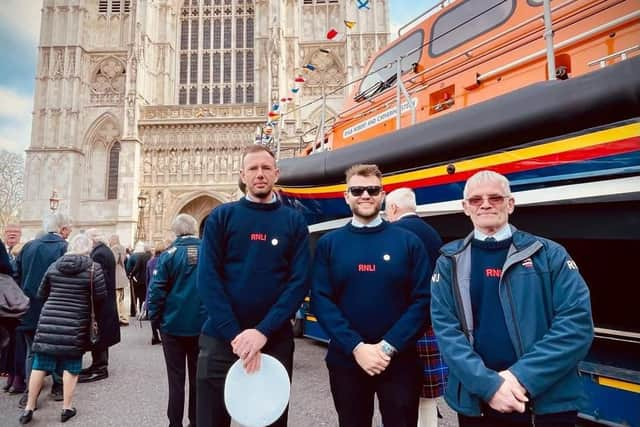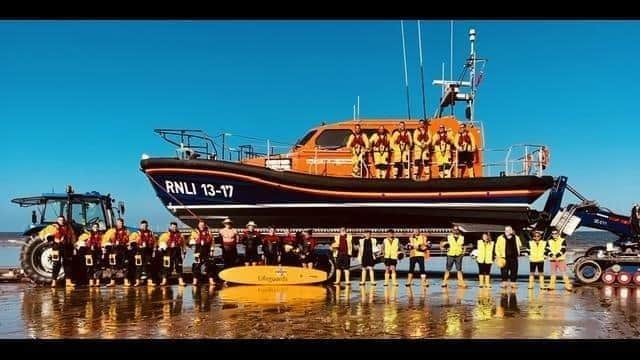RNLI heroes from Lincolnshire coast celebrate charity's 200th anniversary at Westminster Abbey
and live on Freeview channel 276
The Royal National Lifeboat Institution (RNLI) marked the milestone birthday in a special service last Monday, attended by RNLI President, His Royal Highness The Duke of Kent,
Alan Gordon-Griffiths, Water Safety Advisor and Tributes Officer at Skegness Lifeboat Station, was among them.
Advertisement
Advertisement
“It was an honour to be invited to the celebrations at Westminster Cathedral for our 200 year anniversary,” he said.


“What will always be in the forefront of my mind as a volunteer is when Sir William Hillary proposed that the RNLI's number one mission statement was ‘The preservation of human lives from shipwreck; which should always be considered as the first great and permanent object of the institution’.
“All past and present volunteers still fulfil this when responding to our pagers.”
Since it was founded in 1824, RNLI lifeboat crews and lifeguards nationally have saved an incredible 146,277 lives. The charity has launched its lifeboats 380,328 times, while its lifeguards have responded to 303,030 incidents on some of the UK’s busiest beaches.
Advertisement
Advertisement
Representatives from every RNLI lifesaving community – including Skegness and Mablethorpe – attended the service, which took place at the same time the RNLI founding papers were signed back in 1824.


Funded by voluntary donations and with lifeboats crewed by specially trained volunteers, it is a unique organisation. Alongside the 238 RNLI stations – three of which are located in Lincolnshire at Skegness, Mablethorpe and Cleethorpes – there are 240 lifeguarded beaches, all providing a ring of safety around our coast.
Founded in a London tavern on March 4, 1824, following an appeal from Sir William Hillary, who lived on the Isle of Man and witnessed many shipwrecks, the RNLI has continued saving lives at sea throughout the tests of its history including tragic disasters, funding challenges, and two world wars.
From triumphs to tragedies; from oar-powered vessels to the boats packed with cutting-edge technology used today; from introducing the first lifeboats on the River Thames, to rolling out a UK beach lifeguard service; from running the UK’s biggest ever drowning prevention campaigns to working with others to save lives overseas – the RNLI has a remarkable 200-year story to tell.
Advertisement
Advertisement
To illustrate just how far the charity has come, once volunteers launched wooden lifeboats with oars and sails and now they are saving lives on motor-powered all-weather lifeboats with state-of-the-art technology and communications.


While innovations and developments in technology over the course of 200 years have inevitably changed how the charity saves lives, some things have remained the same.
The volunteering ethos at the heart of the RNLI is what makes the charity so special – volunteers have given their time and commitment over the past two centuries, as they continue to do today. And generous donations have continued to power the RNLI’s lifesaving work – everything the RNLI has achieved since 1824 has been made possible thanks to their generosity.
RNLI Chief Executive, Mark Dowie, says: ‘It has been an honour and a privilege to be at the helm of the RNLI for approaching five years, and to see the charity reach its bicentenary.
Advertisement
Advertisement
" For a charity to have survived 200 years based on the time and commitment of volunteers, and the sheer generosity of the public donating to fund it, is truly remarkable.


"It is through the courage and dedication of its incredible people that the RNLI has survived the test of time, including tragic losses, funding challenges, two World Wars and, more recently, a global pandemic.
“In 2024, we mark the bicentenary of the RNLI. We remember the achievements and commitment of all those who have been part of the RNLI family over the past two centuries; we celebrate the worldclass lifesaving service we provide today, based on our 200 years of learning, expertise and innovation, and we hope to inspire future generations of lifesavers and supporters who will take the RNLI into its next century and beyond.
“I am immensely grateful to everyone who is involved with the charity – our volunteers, supporters and staff. This is our watch and it is our role to keep our charity safe and secure so it can continue to save lives into the future, as we strive in our vision to save every one.”
Advertisement
Advertisement
Throughout its anniversary year the charity will be running events and activities at local stations to remember its important history and celebrate the modern life-saving service it is today, while hoping to inspire generations of future lifesavers and supporters.
In the meantime, here’s how you can help: